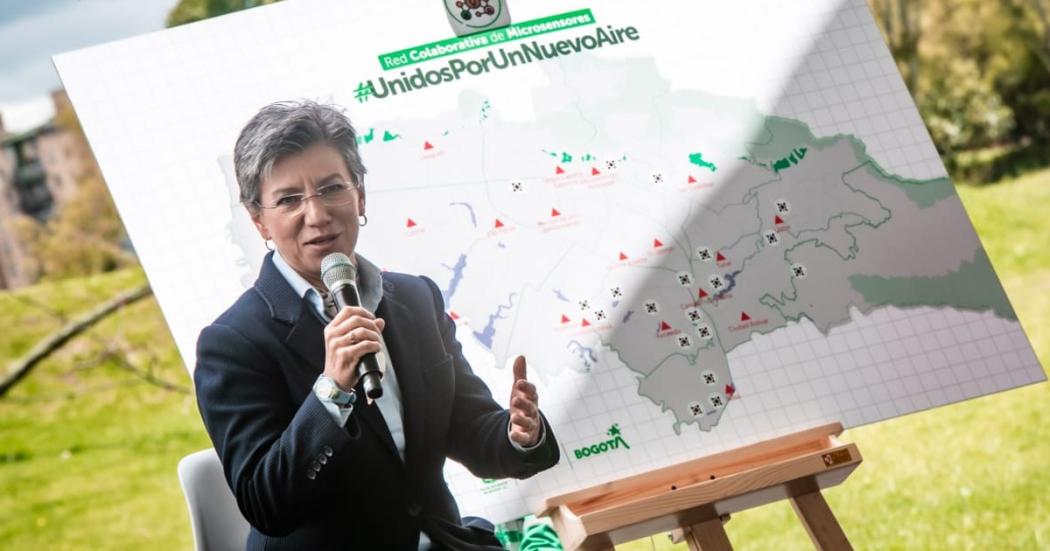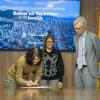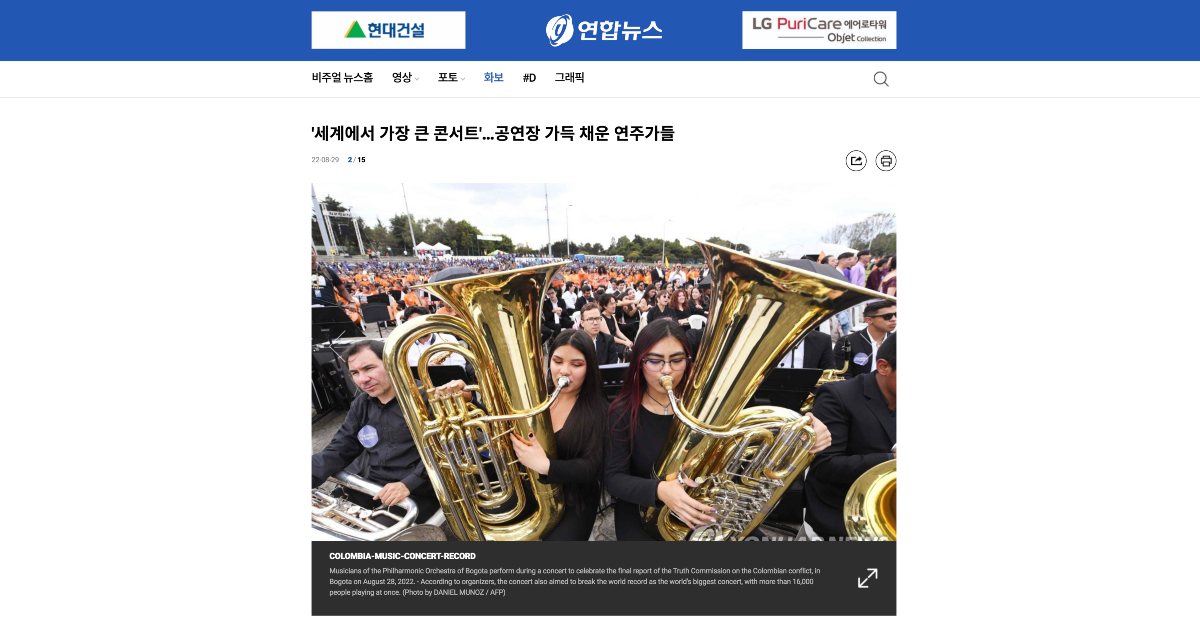As part of the celebration of the UN International Day of Clean Air for blue skies, Bogotá launched the Collaborative Microsensor Network, an instrument to measure the concentration of particulate matter in specific environments (roads, bicycle routes, areas close to schools and kindergartens, neighborhoods, impacts of urban projects among others).
"Information is the basis of rigorous decision-making and this project is one of those key elements to determine exactly what actions to take and where these should be taken for change to be real," said the Mayor of Bogotá, Claudia López.
With the Collaborative Microsensor Network, the Administration seeks, first, to improve air quality management with a more community-centered focus and joint work; second, to meet citizen demands to define the sites of interest for measurement and identify specific episodes of pollution; and third, to encourage research, development, and the implementation of new practices that improve air quality and promote environmental science among citizens.
Here's a tweet with more details from the launch of the Collaborative Microsensor Network:
#EnVivo Hoy celebramos el Día Internacional del Aire Limpio con el lanzamiento de la nueva Red Colaborativa de Microsensores, una moderna herramienta que nos permitirá seguir mejorando en la medición de la calidad del aire en nuestra ciudad.https://t.co/K3VX8zc0E5
— Claudia López Hernández (@ClaudiaLopez) September 7, 2022
Mayor López also stressed that this is one of the various tasks that are part of the complete plan with which the city intends to fight against climate change, including mobility efforts.
"This is how we have managed in the last four years to reduce air quality pollution by 37%, through projects like this together with the replacement of diesel buses with electric vehicles, and the development of spaces that facilitate traffic for pedestrians and cyclists," she added.
As of today, the city will have 20 microsensors that will monitor outdoor air quality or ambient air and have optical technology, which enables real-time collection and transmission of information through mobile internet or wifi to a platform. These devices are located in several areas of the city: Ten in schools or Social Integration units in the boroughs of Usme, Ciudad Bolívar, Tunjuelito, Kennedy, Fontibón, Suba and Bosa; two will be along Carrera Séptima, another two on Calle 13; three, in schools in Bosa and Kennedy; and in the industrial areas of Puente Aranda and Carvajal, among others.
"On this International Day of Clean Air for blue skies, the launch of this network is quite appropriate because it will allow us to more accurately recognize where to work to achieve that goal," said the Secretary of Environment, Carolina Urrutia.
In addition, the microsensors and the Air Quality Monitoring Network, which has 20 stations, will complement Bogotá's air quality surveillance and monitoring system. Microsensors are low-cost (between $2.5 and $4 million per piece of equipment installed in Bogotá) that measure concentrations of particulate matter.
In this tweet, Mayor Claudia López refers to the installation of 20 of the 300 microsensors:
Ya instalamos 20 microsensores, y llegaremos a 300 en 3 años, que miden concentraciones de contaminantes (en especial, de material particulado PM1, PM2.5 y PM10) en diferentes puntos de la ciudad que nos permitirán tener una mejor información para tomar de decisiones con rigor. pic.twitter.com/7vs0iEcANG
— Claudia López Hernández (@ClaudiaLopez) September 7, 2022
"The path to a cleaner Bogotá is already mapped out, not only in the Climate Action Plan, but also in the minds of the citizens who will benefit from these microsensors," said the Secretary.
The inputs will be used for the management and formulation of public policies and to evaluate the impact of some city interventions at the local level, such as the improvement of the road network or increase in vegetation cover, application of restrictions, and improvement in emission control technologies, among others. This Microsensor Network will not replace the Air Quality Monitoring Network.
The microsensors will measure concentrations of contaminants (especially PM1, PM2.5, and PM10 particulate matter). It is expected that between December 2022 and the first quarter of 2023 about 70 new sensors will be installed, thanks to the incorporation of the Avantia (Metropolis) international cooperation project).
During his speech at the launch, the mayor of Denver, Colorado (USA) highlighted this type of initiative and complementary ones in terms of mobility such as the Shared Bicycles program implemented by Bogotá, a model that is being applied in his city.
"I confess that I stole the idea of the Bogotá bicycle network. More than a decade ago we learned how brilliant Bogotá was in terms of promoting the use of bicycles and we are looking to get closer to its number of platforms and bicycle routes in my native Denver," said Michael Hancock.
We work together for a new air
Likewise,Mayor Claudia López’s administration is working on the implementation of zero and low emission zones, to improve air quality, reduce emissions in industry and transport, strengthen vegetation cover, and maintain the road network. In addition, the city has the 2030 Air Plan, which seeks to reduce the concentration of particulate matter (PM) of 2.5 microns by 16.6% and PM10 by 14.2%.
"By being a signatory to the Clean Air Cities Accelerator and the C40 Green and Healthy Streets Accelerator, Bogotá is showing the world how cities can lead the way in implementing integrated solutions on air quality and climate change. We are proud to support Bogotá in the development of the 'United for a New Air' plan," said Cristina Argudo, C40's acting deputy director for Latin America.
The concentration of pollutants in the atmosphere is one of the greatest environmental risks that can occur in a city, hence the commitment of the administration of Mayor Claudia López to promote sustainable growth, mobilize in alternative means of transport, implement responsible consumption, migrate to new technologies and that these are clean, are some of the actions that can be taken to reduce pollution.
C40 Regional Workshop
Between September 7 and 9 in Bogotá, the C40 Regional Workshop will be held for officials from 12 of the main cities of Latin America, to accelerate action against air pollution and global warming.
The conference will be attended by representatives from Bogotá, Buenos Aires, Mexico City, Curitiba, Guadalajara, Lima, Medellín, Quito, Rio de Janeiro, Salvador, Santiago, and São Paulo.
During these three days, representatives will share experiences, discuss best practices being implemented, and explore opportunities to collaborate on initiatives that positively impact air quality in the region.
C40 is a network of nearly 100 mayors from the world's major cities working to implement urgent action to tackle the climate crisis and create an equitable, resilient, prosperous, and sustainable future, and to help the world limit global warming to 1.5°C.
International Day of Clean Air for blue skies
In 2020, the United Nations General Assembly declared September 7 as the International Day of Clean Air for blue skies. This date seeks to raise awareness among people about the importance of implementing new habits to prevent and reduce air pollution, and thus contribute to the well-being of the world population.
Changing habits and stopping using fossil fuels is an undeniable need in today's world. We must transition to clean technologies to help have healthier air and thus contribute to solving human health problems, and prevention and mitigation of climate change.
Here, the broadcast of the Bogotá launch event launches the Collaborative Microsensor Network to measure air quality in microenvironments:








